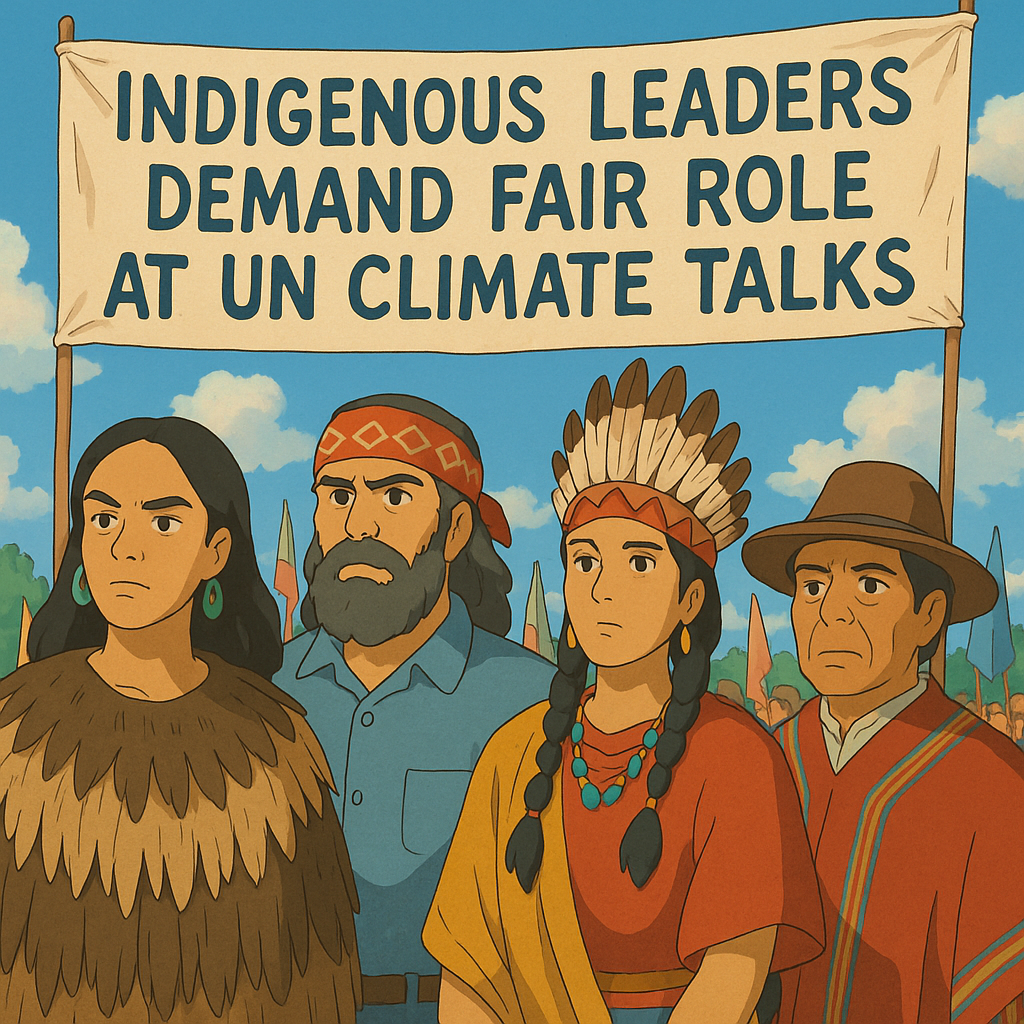Physical Address
18 C Ibbani Harohalli Village
Yelahanka Bengaluru 560064
Physical Address
18 C Ibbani Harohalli Village
Yelahanka Bengaluru 560064

Brasilia, April 28, 2025 – Thousands of Indigenous leaders from the Amazon rainforest, the Pacific Islands, and beyond converged in Brazil’s capital this week, uniting under the banner “We Are the Answer” to demand equal representation at the upcoming UN Climate Conference (COP30) in Belém. The vibrant gathering, marked by traditional attire, body paint, and powerful speeches, underscored the urgent need for Indigenous voices to hold the same weight as world leaders in global climate negotiations.
The rally, attended by approximately 8,000 representatives from over 200 Indigenous communities across Latin America and Oceania, highlighted the disproportionate impact of climate change on Indigenous lands and livelihoods. Despite safeguarding 80% of the world’s remaining biodiversity while constituting just 6% of the global population, Indigenous communities receive less than 1% of international climate funding, according to a recent UN report.
“We are not just stakeholders; we are the stewards of these ecosystems,” said Sinesio Trovao, head of the Betania Mecurane community in Brazil. “Leaders in villages face the real consequences of climate change daily—droughts, wildfires, rising seas. We deserve a seat at the table, not just an invitation to observe.”
The rally coincides with the 24th Session of the UN Permanent Forum on Indigenous Issues (UNPFII), where leaders voiced concerns about resource extraction and the so-called “green transition.” Projects like mining for critical minerals—essential for renewable energy technologies often encroach on Indigenous territories, leading to displacement and environmental degradation. In the U.S. alone, over 75% of lithium, copper, and nickel reserves lie within 35 miles of Indigenous communities.
Set to take place in November 2025 in Belém, COP30 will be the first UN climate summit hosted in the Amazon basin, home to the world’s largest tropical rainforest. Brazilian President Luiz Inácio Lula da Silva has pledged to end illegal deforestation in the Amazon, emphasizing the “vital role” of Indigenous communities in this fight. However, his administration faces criticism for supporting a major offshore oil exploration project near the Amazon River’s mouth, which activists argue undermines climate goals.
Indigenous leaders see COP30 as a pivotal moment to shift the paradigm. “Hosting the summit in the Amazon is symbolic, but symbolism isn’t enough,” said Alisi Rabukawaqa, a Fijian tribal leader. “We need tangible mechanisms—direct funding, veto power over projects on our lands, and a formal seat in negotiations.” Brazil has announced the creation of a Circle of Indigenous Leadership at COP30 to amplify these voices, but details on its authority remain unclear.
The Brasilia rally showcased solidarity across continents. Aboriginal Australian and Pacific Island representatives joined Amazonian leaders to share stories of rising sea levels threatening low-lying islands like Fiji and wildfires devastating South American forests. Last year’s record drought in Brazil fueled wildfires that destroyed nearly 18 million hectares of Amazon rainforest, according to MapBiomas.
“We fight the same battle,” said Rabukawaqa. “Our islands are sinking, their forests are burning, but the root cause is the same—global inaction and exclusion of those who know the land best.”
The rally also addressed the health impacts of climate change on Indigenous communities. A UN report, incorporating insights from the World Health Organization, noted that in the Arctic, shifting wildlife migration patterns disrupt traditional hunting, causing food insecurity. In East Africa, Indigenous women face heightened risks from climate-related diseases like schistosomiasis due to changing water systems.
Indigenous advocates are not new to the UN climate stage but argue their influence remains limited. At COP29 in Baku, Azerbaijan, only 170 Indigenous representatives attended, dwarfed by over 1,700 fossil fuel lobbyists. The final agreement was deemed “drastically insufficient” by advocates like Graeme Reed, an Anishinaabe leader, who criticized the lack of formal Indigenous representation in negotiations.
To address this, leaders are proposing an international Indigenous Commission and aiming to bring 3,000 delegates to COP30. They also seek to integrate the Local Communities and Indigenous Peoples Platform into the UN’s core decision-making process, ensuring their knowledge, described as “time-tested, method-driven” science, shapes global policy.
For example, in Peru, Quechua communities have revived ancestral water management practices to combat drought, now shared with Costa Rican farmers. Such innovations highlight the potential of Indigenous-led solutions if given adequate support.
The week-long Brasilia rally includes marches on government buildings and a special congressional session on Indigenous rights. As participants chanted and waved banners, their message was clear: climate justice is inseparable from Indigenous rights.
“We are the answer because we’ve been living sustainably for millennia,” said Trovao. “Give us the power to lead, and we can show the world how to heal the planet.”
As COP30 approaches, the global community faces a critical choice: continue sidelining Indigenous expertise or embrace it as a cornerstone of climate action. For the thousands rallying in Brasilia, the answer is non-negotiable—equal representation now.